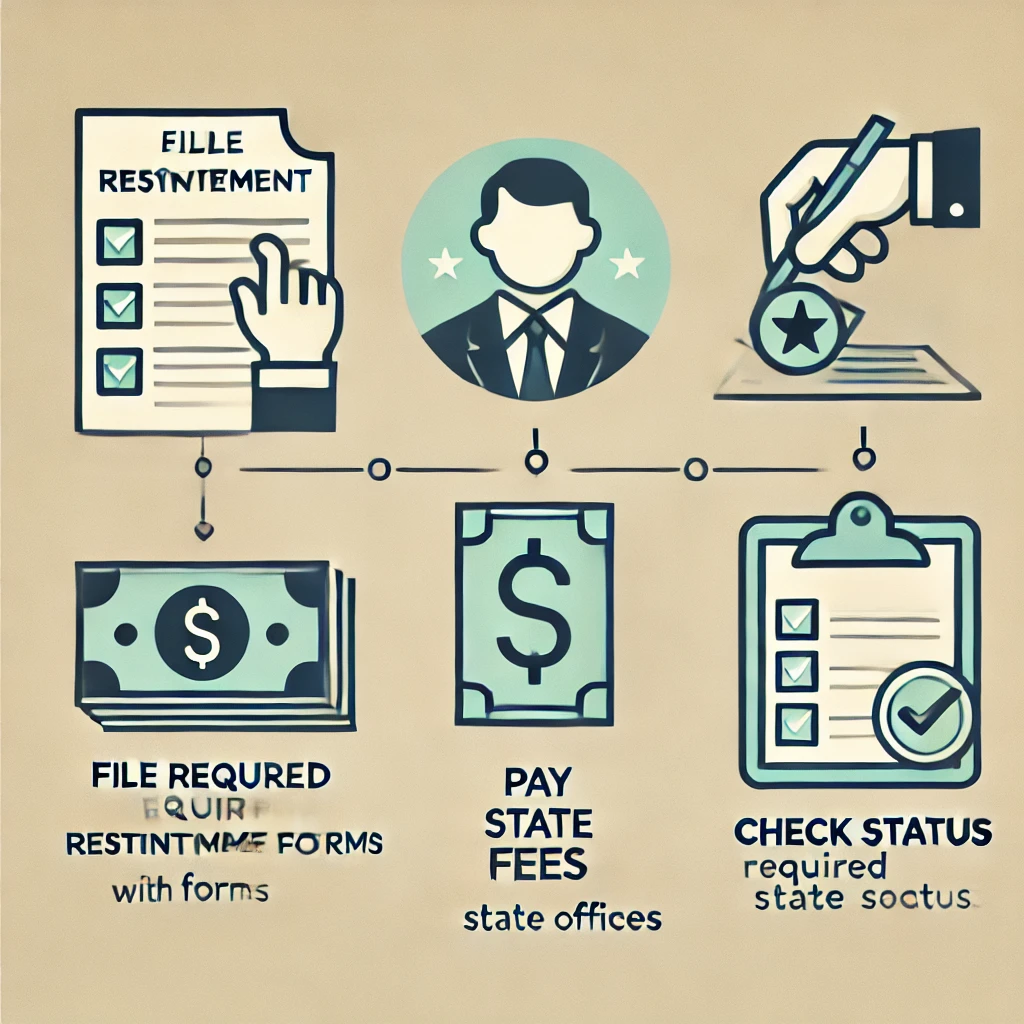Reinstate Your LLC
Why Choose Buykii
Start Your Reinstatement
Compliance Review
We audit your entity’s history, filings and any state penalties.
Paperwork & Filings
We prepare all forms, catch up reports, and submit to the state.
Back in Good Standing
You’ll receive confirmation and guidance to stay compliant.
Filing
Reinstatement

Submit Reinstatement Forms
File the required forms with the appropriate state office
Pay Outstanding Fees
Settle any state fees necessary for reinstatement.
Await Approval
Monitor your application status and receive official reinstatement approval.
Know About All Delinquent Tax, Annual Reports, and Government Fees Before Reinstatement
If your LLC has been delinquent for over a year due to missed tax filings, annual reports, or state fees, reinstatement is essential. We handle the process for you by contacting the state departments to identify overdue reports, outstanding fees, and required filings.
Why Reinstatement is Important Service?

What Is an LLC Reinstatement?
Imagine you’ve set up your business, things were going fine, and then—life happened. Maybe you missed a deadline, didn’t file an annual report, or forgot to pay a renewal fee. One day, you try to apply for a loan, sign a contract, or renew a license, and boom—you discover your LLC has been dissolved by the state. That moment of confusion and panic is more common than you think.
This is where LLC reinstatement comes in.
LLC Reinstatement is the legal process of bringing your dissolved or inactive company back to life. Whether your business was shut down voluntarily or by the state (called administrative dissolution), you can reinstate your LLC by filing certain forms, paying outstanding fees, and correcting compliance issues.
Many business owners ask, “How do I reinstate my LLC?”The process varies by state, but generally, it involves submitting an application to reinstate a dissolved company, clearing any backlogs like taxes or reports, and paying a reinstatement fee. Once approved, your business becomes active again and back in good standing with the state.
This means:
You can sign contracts again.
Reopen your business bank account.
Continue your business operations legally.
Why Would an LLC or Corporation Be Dissolved or Suspended?
You’re running your business, focused on daily operations, trying to grow, serve clients, and manage expenses. But behind the scenes, there are certain compliance requirements your LLC or Corporation must meet to stay legally active—and it’s easy to miss one.
Let’s say you forgot to file your annual report, didn’t pay your state business fees, or changed your address without notifying the state. In such cases, the state doesn’t send multiple warnings—it simply suspends or dissolves your company.
This is known as administrative dissolution.
Here are the common reasons why an LLC or Corporation can be dissolved or suspended:
Failure to File Annual Reports -
Most states require a limited liability company annual report every year. Miss it, and you’re at risk.
Unpaid State Fees or Taxes - If you don’t pay your business license fees or state franchise taxes, your company can be suspended.
Registered Agent Not Updated -Your business must have an active registered agent. If they resign or you forget to update their info, the state can take action.
Change of Business Address Not Reported -Didn’t notify the state about your LLC address change? That’s a compliance violation.
Inactive Business Operations - If the state sees no activity or filings, it may assume your business has stopped operating and close it.
So if you’re wondering “Why was my LLC dissolved?” or “Why can’t I renew my business license?” — it’s likely one of these issues.
Can a Dissolved Company Be Reinstated?
Yes, a dissolved company can often be reinstated.
When a business is administratively dissolved (usually for missing filings or payments), it doesn’t always mean it’s the end. Most U.S. states allow you to reinstate your LLC or reactivate a dissolved company, as long as you meet the state’s requirements.
Whether your goal is to reinstate a company, reactivate LLC status, or bring your business back in good standing, here’s what matters
Things That Make Reinstatement Possible:
The state permits reinstatement (most do—but some have deadlines).
You file an application to reinstate a dissolved company.
You pay any outstanding fees, taxes, and penalties.
You file any missing reports (like the LLC annual report).
You appoint a valid registered agent, if needed.
When Should You Reinstate a Business?
Let’s say you tried to apply for a loan, sign a lease, or land a government contract—but you were told your LLC is not in good standing or even dissolved. Maybe you missed filing your annual report, forgot to pay a small fee, or moved your address without updating the state.
Now what?
This is exactly when you should consider LLC reinstatement — because operating with a dissolved entity is risky, and in most states, it's technically illegal to conduct business without a valid, active status.
Here’s When You Should Reinstate:
Waiting too long to reinstate your LLC can result in:
That’s why it’s important to act fast if your business has been suspended or dissolved.
What Happens If You Don’t Reinstate Your LLC?
If you don’t reinstate your LLC, here’s what can happen:
Legal & Financial Risks:
Financial Loss:
Growth Roadblocks:
Brand Reputation:
Bringing your LLC back in good standing not only protects you legally—it opens doors to future growth, financing, and opportunity.
What Happens If You Don’t Reinstate Your LLC?
Your business has been running fine, but due to missing an annual report deadline, unpaid fees, or another compliance issue, your LLC is dissolved or suspended by the state. Now you're stuck asking, “Should I reinstate my LLC or just start a new one?”
Let’s break it down to help you decide what’s right for your situation.
LLC Reinstatement -Reinstating an LLC simply means restoring your dissolved company back into good standing with the state. It’s like hitting “Resume” on your business without losing your original identity, history, or assets.
Benefits of Reinstating Your LLC:
Forming a New LLC -While forming a new LLC might sound easier, it comes with its own challenges — especially if your previous business had built credibility or customer trust.
Pros:
Cons:
If your business still has value, clients, or brand recognition — reinstating your LLC is usually the better, cost-effective, and less risky choice.
If you’re pivoting completely or want to leave the past behind — forming a new LLC might make more sense, but be ready for extra time, paperwork, and costs.
